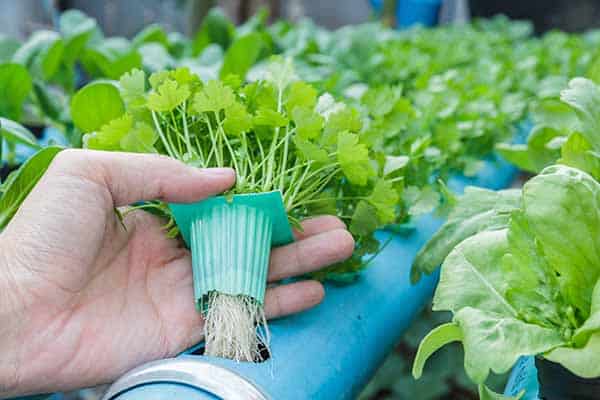As the world population continues to grow, the need for more efficient and sustainable agricultural practices becomes quite critical. With more and more arable land being lost to concrete cities, deteriorating health of the available land along with paucity of water, making agriculture productive and sustainable is becoming a challenge. To this, the urban farms have responded quite positively and have adopted technologies like hydroponic and aeroponic farming.
Hydroponic farming uses 35% less water than traditional agriculture and unlike the same, it does not require soil to promote growth and nutrition.

Traditional agriculture is more inclined towards water losses in the form of evaporation and run-off. To conserve water and use it judicially, the farmers today, use the drip irrigation method. Even though its efficient, drip irrigation is not even close to water conservation that is possible through hydroponics. This technique of growing food with absolutely no soil and less water has grabbed a lot of attention, especially among Indian metros and western countries. Indian cities are leveraging the power of hydroponic farming as the cities are getting overcrowded with very less farming land and dependence on rural areas for their produce needs.
Here are few advantages of Hydroponics farming
It allows plantation without the use of soil and the plants can be grown in limited land areas allowing better use of space and location. It allows the roots to sink in a tank full of oxygenated nutrient-rich solutions. The direct contact of vital minerals allows plants to grow in proximity and saves huge spaces.
To the advantage of hydroponic growers, this farming technique allows better control of temperature, light, humidity and climate. Food can be produced quickly, efficiently, throughout the year depending upon the high requirements irrespective of the season.
Hydroponics exhibit better growth and high yields due to the utmost favourable conditions maintained. Nutrients are directly provided to the roots and so plants do not have to impose a lot of energy to fetch the same as in the traditional farming method.
This is an eco-friendly production practice that helps in curbing CO2 emissions.
The many advantages of hydroponics indicate the potential this farming technique holds for the farmers, consumers and the agricultural economy. Hydroponic farm systems are estimated to generate an average revenue of $21.15 or INR 1,530.98 per square foot. It is indeed a promising farming system that can prove beneficial to save the land and produce a large amount of food without altering the soil nutrients.

